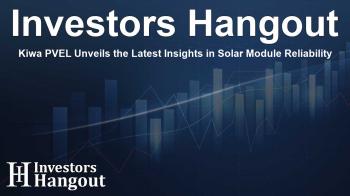Kiwa PVEL Unveils the Latest Insights in Solar Module Reliability

Kiwa PVEL Releases Latest PV Module Reliability Scorecard
The total number of Top Performers remains steady, but failures have increased. Kiwa PVEL, an independent lab specializing in testing the quality and reliability of solar photovoltaic (PV) modules, recently published its annual PV Module Reliability Scorecard. This digital report is crucial for solar industry stakeholders, offering insights derived from the company’s prestigious Product Qualification Program (PQP).
Insights from the 2025 Scorecard
The 11th edition of the Scorecard features 50 manufacturers who have achieved recognition as "Top Performers" in various tests. Interestingly, nine manufacturers managed to secure this title for at least one model in each of the seven test categories, highlighting the competitive landscape of PV module performance.
Key Highlights and Trends
Some of the standout findings from the Scorecard include:
- Only 21 model types received Top Performer status across all reliability tests: Temperature Cycling (TC), Damp Heat (DH), Mechanical Stress (MSS), Hail Simulation (HSS), Potential Induced Degradation (PID), and Light and Elevated Temperature Induced Degradation (LID+LETID). Of these, just three also excelled in the Performance Assessment for Nexus (PAN).
- Results were mixed across the various PQP tests as certain areas saw improvement while others saw setbacks. While PID and PAN results have exhibited progress, the breakage rates for MSS and HSS modules have risen. Furthermore, although results for Ultraviolet Induced Degradation (UVID) are beginning to show improvement, they remain a concern for many.
- As a reflection of the increasing challenges in the market, 83% of module manufacturers reported at least one test failure, a significant rise from the 66% documented in the previous year’s Scorecard.
Vice President of Sales and Marketing at Kiwa PVEL, Tristan Erion-Lorico, noted, "The rapid pace of innovation in the PV module landscape is encouraging, and it's great to see more products achieving Top Performer status. However, we continue to advise buyers not to assume all modules are equal. Our testing reveals notable variability in performance and long-term reliability, making the Scorecard an invaluable tool for procurement teams as they navigate these complexities."
Addressing Market Dynamics
The complete 2025 PV Module Reliability Scorecard can be examined online, with a feature allowing users to filter by manufacturer, module type, and test category, enhancing the analysis regarding solar technologies. Moreover, users can download custom search results for further examination.
Managing Director Kevin Gibson expressed, "Our 2025 Scorecard unveils the duality of progress and challenges present within the dynamic PV module market. For over a decade, we have executed thorough testing of modules to identify reliability and performance trends, and this year has upheld that tradition. While not every outcome met our expectations, numerous tests did reveal excellence in an evolving industry."
To be included in the Scorecard, manufacturers must complete the PQP sample production factory witness and present at least two factory-witnessed PV module samples across all reliability tests, following Kiwa PVEL’s BOM test standards.
About Kiwa PVEL
Kiwa PVEL stands at the forefront of reliability and performance testing for solar project developers, financiers, and asset owners globally. As a part of the broader Kiwa Group, Kiwa PVEL offers integrated services tailored for the solar supply chain, focusing on risk mitigation, financing optimization, and enhancing the performance of solar and energy storage systems throughout each project phase.
For over ten years, Kiwa PVEL’s Product Qualification Program (PQP) has transformed the understanding of PV module performance from assumptions into measurable data. The related data and consulting services provided serve as essential procurement intelligence for a network of downstream solar buyers. Visit kiwa.com/pvel and kiwa.com/solar to find out more.
Frequently Asked Questions
What is the purpose of Kiwa PVEL's Scorecard?
The Scorecard offers comprehensive insights into the reliability and performance of PV modules, helping industry stakeholders make informed purchasing decisions.
How many manufacturers were recognized as Top Performers?
A total of 50 manufacturers were recognized as Top Performers for their PV modules in the latest Scorecard.
What trends did the Scorecard reveal?
The Scorecard highlighted mixed results, with some categories showing improvement while others faced increased failure rates.
Why is testing crucial for PV modules?
Testing is vital to ensure performance and reliability, helping buyers avoid unreliable products amidst a diverse market.
How can users access the Scorecard?
The complete Scorecard, including detailed test results and filtering options by manufacturer and module type, is available online.
About The Author
Contact Dylan Bailey privately here. Or send an email with ATTN: Dylan Bailey as the subject to contact@investorshangout.com.
About Investors Hangout
Investors Hangout is a leading online stock forum for financial discussion and learning, offering a wide range of free tools and resources. It draws in traders of all levels, who exchange market knowledge, investigate trading tactics, and keep an eye on industry developments in real time. Featuring financial articles, stock message boards, quotes, charts, company profiles, and live news updates. Through cooperative learning and a wealth of informational resources, it helps users from novices creating their first portfolios to experts honing their techniques. Join Investors Hangout today: https://investorshangout.com/
The content of this article is based on factual, publicly available information and does not represent legal, financial, or investment advice. Investors Hangout does not offer financial advice, and the author is not a licensed financial advisor. Consult a qualified advisor before making any financial or investment decisions based on this article. This article should not be considered advice to purchase, sell, or hold any securities or other investments. If any of the material provided here is inaccurate, please contact us for corrections.

